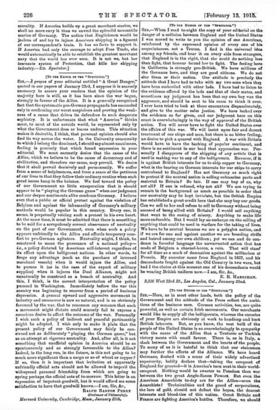[To som Hanes as Too .13rocrAlos..3
SIR,-2 propos of your editorial entitled "A Great Danger," quoted in our papers of January 23rd, I suppose it is scaruely necessary to assure your readers that the opinion of the majority here is still, as it has been since the war began, strongly in favour of the Allies. It is a generally recognized fact that the systematic pro-German propaganda has succeeded only in confirming our worst suspicions and proving the weak- nesa of a cause that drives its defenders to each desperate sophistry. It is unfortunate that what "America" thinks must, to moat of the outside world, he represented only by what the Government does or leaves undone. This situation makes it desirable, I think, that personal opinion should also find its way across the water. In the University community to which I belong the dominant, 1 should say almost unanimous, feeling is precisely that which found expression in your editorial. We most earnestly desire that the cause of the Allies, which we believe to be the cause of democracy and of civilization, and therefore our cause, may prevail. We desire that it shall prevail decisively and permanently. We suffer from a sense of helplessness, and from a sense of the pettiness of our lives in that they follow their ordinary routine when such great issues hang in the balance. We feel toward the policy of our Government no little exasperation that it should appear to be "playing the German game" when our judgment and our deeper sentiments alike condemn Germany. I believe even that a public or official protest against the violation of Belgium and against the inhumanity of Germany's military methods would be popular in this country. Every one, it seems, is perpetually voicing such a protest in his own heart. At the mime time, it must be admitted that there is something to be said for a scrupulously correct observance of neutrality on the part of our Government, even when such a policy appears unfriendly to the Allies and affords temporary com- fort to pro-German agitators. Neutrality might, I think, be construed to mean the pursuance of a national policy— is., a policy dictated by American self-interest regardless of its effect upon the belligerent nations. In other words, to forgo any advantage (such as the purchase of interned merchant vessels) when it would injure the Allies, and to pursue it (as in the cure of the export of military supplies) when it injures the Dual Alliance, might not unnaturally be construed as a breach of neutrality. And this, I think, is the correct interpretation of the policy pursued in Washington. Immediately before the war this country was beginning to recover from a period of business depression. A general upward and aggressive movement in industry and commerce is now so natural, and is so obviously favoured by the scar, that to renounce any measure that such a movement might dictate could scarcely fail to express a conscious desire to affect the outcome of the war. Personally I wish such a policy of indirect and peaceful partisanship might be adopted. I wish only to make it plain that the present policy of our Government may fairly be con- strued not as deliberately " playing the German game," bat as an attempt at rigorous neutrality. And, after all, is it not something that unofficial opinion in America should be so spontaneously and so strongly favourable to the Allies? Indeed, in the long run, in the future, is this not going to he much more significant than a cargo or so of wheat or copper P If so, then it is important that irritation at apparently unfriendly official acts should not be allowed to imperil the widespread personal friendship from which are going to spring perhaps the official acts of to-morrow. This letter is an expression of impotent goodwill, but it would afford me some satisfaction to have that goodwill known.—I am, Sir, &c., RALPH BARTON PERRY fiseteeser of rnneseahs). /laniard University, Cambridge, Maas., January 271h.






































 Previous page
Previous page